WHAT'S
NEXT?
|
New Scientist, Arts & Letters Daily, The Observer's Very Short List, Los Angeles Times, Playback, Newsweek, Times & Transcript, The Futurist, Washington Times, Barnes & Noble Review |
Table of Contents |
|
|
Science, the next
generation FOR PROPHETIC visions of the future, some people turn to horoscopes or fortune tellers. But if you really want to know what the future holds, ask a scientist. Not just a renowned, seasoned scientist, but a fresh mind, someone who is asking themselves the questions that will define the next generation of scientific thought. That's precisely what Max Brockman has done in this captivating collection of essays, written by "rising stars in their respective disciplines: those who, in their research, are tackling some of science's toughest questions and raising new ones". The result is a medley of big ideas on topics ranging from cosmology and climate change, to morality and cognitive enhancement. The collection is diverse, but one theme resounds: when it comes to the human race, the whole is greater than the sum of its parts. We owe our evolutionary success to our unique modes of social behaviour. Social species In their essay "Out of our minds", journalist Vanessa Woods and anthropologist Brian Hare suggest that it wasn't intelligence that led to social behaviour, but rather social behaviour that paved the way for the evolution of human intelligence. "Humans got their smarts only because we got friendlier first," they write. We are a social species, and we have our brains to thank. As Harvard University neuroscientist Jason Mitchell writes: "The most dramatic innovation introduced with the rollout of our species is not the prowess of individual minds, but the ability to harness that power across many individuals." Language allows us to do this in an unprecedented way — it serves as a vehicle for transferring one's own mental states into another's mind. Lera Boroditsky — a professor of psychology, neuroscience and symbolic systems at Stanford University — has an interesting piece about the ways in which our native language shapes the way we think about such basic categories as space, time and colour. ... |
The Long List 50 books, CDS, and DVDs to know about now SCIENCE What's Next Nearly impossible to put down: engaging original essays from brilliant young scientists on their work — and its fascinating social, ethical, and philosophical implications. |
People's exposure to the world of science is too often limited to watching the Discovery Channel or "reading" National Geographic. But the essence of science is not only what is happening today, but what could happen tomorrow. "What's Next? Dispatches on the Future of Science" is a book of science essays collected and edited by Max Brockman. It boasts that the authors of the 18 original essays that make up this book come from a "new generation of scientists" and are the future of science. The essays cover a range of topics. In "Will We Decamp for the Northern Rim?," Lawrence C. Smith writes that the world can't escape global warming, regardless of policy changes. Stephon H.S. Alexander discusses dark matter and vacuum energy in "Just What Is Dark Energy." Vanessa Woods and Brian Hare's "Out of Our Minds: How Did Homo sapiens Come Down From the Trees, and Why Did No One Follow?" notes the theory of evolution and its relation to humans is still a work in progress. ... ...In his preface, Mr. Brockman says of the scientists writing in this collection that "their ideas will eventually help to redefine who and what we are." It is a claim well supported by this engaging book. Perhaps the world started with a bang, but if the scientists who contributed to "What's Next?" have anything to do with it, it will certainly not end with a whimper. [...] |
Time flies faster as we age . . . or so it seems ...I take the following from an essay titled "Brain Time" by Dr. David M. Eagleman which appears in a book called "What's Next? Dispatches on the Future of Science," edited by Max Brockman. Dr. Eagleman is a bright young scientist who has undergraduate degrees from Rice University and Oxford University in literature, but who obtained a doctorate in neuroscience from the Baylor College of Medicine 11 years ago. Today he is director of the Baylor College of Medicine's Laboratory for Perception and Action. The lab's long-term goal is to "understand the neural mechanisms of time perception," which in plain English is to figure out how our brains make us think time has slowed or sped up when it hasn't. It was his and his colleagues' work that allowed me to say that our intuitions are correct: people in traumatic situations do perceive time to slow, but a hair-raising experiment shows they have no extra time to react or do anything extra beyond what would normally be possible. An explanation We perceive the slow motion because time and memory are "tightly linked," says Dr. Eagleman. In such critical situations a part of our brain called the amygdala kicks into high gear and takes over most of the brain's resources. This forces a secondary memory system to do the processing, a system that can later produce flashbacks of the sort soldiers with post-traumatic stress experience. This backup memory is "stickier" than what our brains usually use to store memories, producing more vivid and clear images in our minds; more detail. And in remembering these, since there are many more images, just like inserting extra images in a movie reel, it makes the event appear to last longer and slows motion down. That much is fairly certain. ... [...] |
By Sharon Begley A psychologist at Stanford University, she has long been intrigued by an age-old question whose modern form dates to 1956, when linguist Benjamin Lee Whorf asked whether the language we speak shapes the way we think and see the world. If so, then language is not merely a means of expressing thought, but a constraint on it, too. Although philosophers, anthropologists, and others have weighed in, with most concluding that language does not shape thought in any significant way, the field has been notable for a distressing lack of empiricism—as in testable hypotheses and actual data. That's where Boroditsky comes in. In a series of clever experiments guided by pointed questions, she is amassing evidence that, yes, language shapes thought. The effect is powerful enough, she says, that "the private mental lives of speakers of different languages may differ dramatically," not only when they are thinking in order to speak, "but in all manner of cognitive tasks," including basic sensory perception. "Even a small fluke of grammar"—the gender of nouns—"can have an effect on how people think about things in the world," she says. ... ...Language even shapes what we see. People have a better memory for colors if different shades have distinct names—not English's light blue and dark blue, for instance, but Russian's goluboy and sinly. Skeptics of the language-shapes-thought claim have argued that that's a trivial finding, showing only that people remember what they saw in both a visual form and a verbal one, but not proving that they actually see the hues differently. In an ingenious experiment, however, Boroditsky and colleagues showed volunteers three color swatches and asked them which of the bottom two was the same as the top one. Native Russian speakers were faster than English speakers when the colors had distinct names, suggesting that having a name for something allows you to perceive it more sharply. Similarly, Korean uses one word for "in" when one object is in another snugly (a letter in an envelope), and a different one when an object is in something loosely (an apple in a bowl). Sure enough, Korean adults are better than English speakers at distinguishing tight fit from loose fit. In Australia, the Aboriginal Kuuk Thaayorre use compass directions for every spatial cue rather than right or left, leading to locutions such as "there is an ant on your southeast leg." The Kuuk Thaayorre are also much more skillful than English speakers at dead reckoning, even in unfamiliar surroundings or strange buildings. Their language "equips them to perform navigational feats once thought beyond human capabilities," Boroditsky wrote on Edge.org. ... [...] |
|
Max Brockman, ed. | What's Next? Dispatches on the Future of Science (Vintage)
If your favorite day of the week is Tuesday, because that's when the Science section of The New York Times is published, and your favorite NPR show is Ira Flatow's Science Times, then you'll love What's Next? Dispatches on the Future of Science, a collection of essays written by young scientists about what they do and how they see the future of their fields. Even if you're not quite that much of a science geek, if you have an interest in the world around you and the process by which scientific research can both explain and mold that world, you'll enjoy this collection edited by Max Brockman. No expertise in any field is required to understand these essays; if you can follow Malcolm Gladwell, you'll have no troubles with What's Next? Brockman's essayists represent a variety of fields, from physics to paleoanthropology, with a heavy leaning toward the human sciences. This is a good choice from the marketing point of view, since non-scientists tend to be more interested in topics relating to human psychology than, say, the role played by dark energy in accelerating the expansion of the universe, but fans of hard science may feel slighted. That objection aside, this is the perfect collection for people who like to stay up on recent scientific research but haven't the time or expertise to go to the original sources (which, in the case of modern science, usually means articles published in professional journals, which are not generally available to those without access to an academic library). Each essay is self-contained, making it possible to choose those most relevant to your own interests. And it's a great airplane or beach book because you can read the essays in any order; each is brief enough to be read between the interruptions of gate announcements or children demanding attention. My personal favorite is "What Makes Big Ideas Sticky?" by UCLA psychologist Matthew Lieberman, which argues that ideas which mirror the structure and function of the human brain may seem so obviously true to us that they resist being discarded, even in the face of overwhelming amounts of scientific research demonstrating their lack of merit. The collection closes with an essay by NASA climatologist Gavin Schmidt entitled "Why hasn't specialization led to the Balkanization of science?" He argues that in contradiction to the stereotype of the scientist as someone who knows more and more about less and less, interdisciplinary research is central to modern science and describes both the factors which lead to greater isolation among fields of research, and those which encourage cooperation and sharing of ideas. Communication of major ideas in nontechnical language is one of the factors which encourages cooperation, and What's Next? represents an important contribution to that effort. 256 pages. $14.95 (paperback) |
|
Does language shape our thinking?
An essay on how language influences thought from the pop-science anthology "What's Next: Dispatches on the Future of Science" has been posted on The Edge. Author Lera Boroditsky, an assistant professor of psychology, neuroscience and symbolic systems at Stanford, writes:
She brings up experiments and other examples involving use of language and direction, time, color and gender, all of which seem to demonstrate that yes, language shapes how we think. But my favorite is this example above. Only a linguist — or perhaps a social scientist — would put Chomsky in a hypothetical. — Carolyn Kellogg |
|
|
NEW BOOKS For prophetic visions of the future, some people turn to horoscopes. But if you want to know what the future holds, better to ask a scientist... more» |
John
Brockman, Editor
and Publisher |
|Top| |



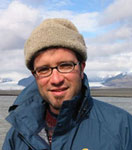 At stake is no less than the global pattern of human settlement in the twenty-first century.
At stake is no less than the global pattern of human settlement in the twenty-first century.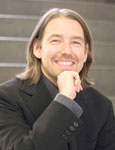 Evolution has equipped our brains with circuits that enable us to experience what other individuals do and feel.
Evolution has equipped our brains with circuits that enable us to experience what other individuals do and feel.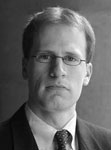 Given our rudimentary understanding of the human organism, particularly the brain, how can we hope to enhance such a system? It would amount to outdoing evolution....
Given our rudimentary understanding of the human organism, particularly the brain, how can we hope to enhance such a system? It would amount to outdoing evolution.... The early universe is hot and dense; the late universe is cold and dilute. Well...why is it like that? The truth is, we have no idea.
The early universe is hot and dense; the late universe is cold and dilute. Well...why is it like that? The truth is, we have no idea. 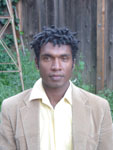 Dark energy, itself directly unobservable, is the most bewildering substance known, the only "stuff" that acts both on subatomic scales and across the largest distances in the cosmos.
Dark energy, itself directly unobservable, is the most bewildering substance known, the only "stuff" that acts both on subatomic scales and across the largest distances in the cosmos. Using modern brain-imaging techniques, scientists are discovering that the human brain does indeed change well beyond early childhood.
Using modern brain-imaging techniques, scientists are discovering that the human brain does indeed change well beyond early childhood.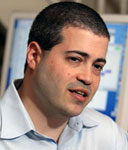 Big Ideas sometimes match the structure and function of the human brain such that the brain causes us to see the world in ways that make it virtually impossible not to believe them.
Big Ideas sometimes match the structure and function of the human brain such that the brain causes us to see the world in ways that make it virtually impossible not to believe them.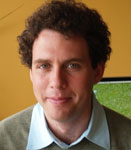 People often speak of a "moral faculty" or a "moral sense," suggesting that moral judgment is a unified phenomenon, but recent advances in the scientific study of moral judgment paint a very different picture.
People often speak of a "moral faculty" or a "moral sense," suggesting that moral judgment is a unified phenomenon, but recent advances in the scientific study of moral judgment paint a very different picture.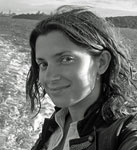 Language is a uniquely human gift, central to our experience of being human. Appreciating its role in constructing our mental lives brings us one step closer to understanding the very nature of humanity.
Language is a uniquely human gift, central to our experience of being human. Appreciating its role in constructing our mental lives brings us one step closer to understanding the very nature of humanity.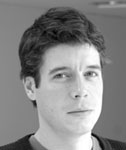 Once we come to understand how our memories are formed, stored, and recalled within the brain, we may be able to manipulate them—to shape our own stories. Our past—or at least our recollection of our past—may become a matter of choice.
Once we come to understand how our memories are formed, stored, and recalled within the brain, we may be able to manipulate them—to shape our own stories. Our past—or at least our recollection of our past—may become a matter of choice.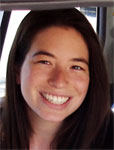 The main goal of my research is to discover the nature of the what-if mechanism and how it allows us to create and comprehend fictional worlds.
The main goal of my research is to discover the nature of the what-if mechanism and how it allows us to create and comprehend fictional worlds.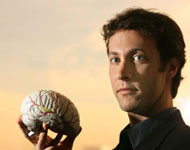 The days of thinking of time as a river—evenly flowing, always advancing—are over. Time perception, just like vision, is a construction of the brain and is shockingly easy to manipulate experimentally.
The days of thinking of time as a river—evenly flowing, always advancing—are over. Time perception, just like vision, is a construction of the brain and is shockingly easy to manipulate experimentally.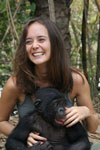 Vanessa Woods, author of It's Every Monkey for Themselves, is an award-winning
journalist who has a double degree in biology and English from the University of New South
Wales. She is a
researcher with the Hominoid Psychology Research Group and studies the psychology of
bonobos and chimpanzees in Africa.
Vanessa Woods, author of It's Every Monkey for Themselves, is an award-winning
journalist who has a double degree in biology and English from the University of New South
Wales. She is a
researcher with the Hominoid Psychology Research Group and studies the psychology of
bonobos and chimpanzees in Africa. 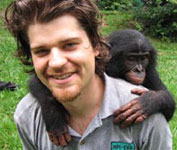 Brian Hare is an anthropologist and an assistant professor in the Department of
Biological Anthropology and Anatomy at Duke University. His research centers on human cognitive evolution, and his
experience in the field includes work in Siberia, the jungle of Uganda, and the Democratic Republic of
the Congo.
Brian Hare is an anthropologist and an assistant professor in the Department of
Biological Anthropology and Anatomy at Duke University. His research centers on human cognitive evolution, and his
experience in the field includes work in Siberia, the jungle of Uganda, and the Democratic Republic of
the Congo. 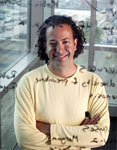 While viruses have to infect cellular forms of life in order to complete their life cycles, this does not mean that causing devastation is their destiny. The existing equilibrium of our planet is dependent on the actions of the viral world, and their elimination would have profound consequences.
While viruses have to infect cellular forms of life in order to complete their life cycles, this does not mean that causing devastation is their destiny. The existing equilibrium of our planet is dependent on the actions of the viral world, and their elimination would have profound consequences.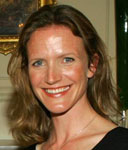 We would like to know what the conditions and selection pressures were that tipped the ancestors of the eusocial insects over the ledge and down toward eusociality.
We would like to know what the conditions and selection pressures were that tipped the ancestors of the eusocial insects over the ledge and down toward eusociality.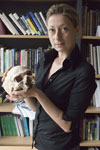 It is now clear that humans (whether fossil or living) are not immune from biological forces and that extinction was (and, indeed, is) a distinct possibility.
It is now clear that humans (whether fossil or living) are not immune from biological forces and that extinction was (and, indeed, is) a distinct possibility.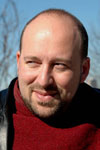 Even as scientific output has increased exponentially, concerns have been raised that growing specialization will end by making it impossible for scientists in different fields to communicate, let alone collaborate.
Even as scientific output has increased exponentially, concerns have been raised that growing specialization will end by making it impossible for scientists in different fields to communicate, let alone collaborate.




